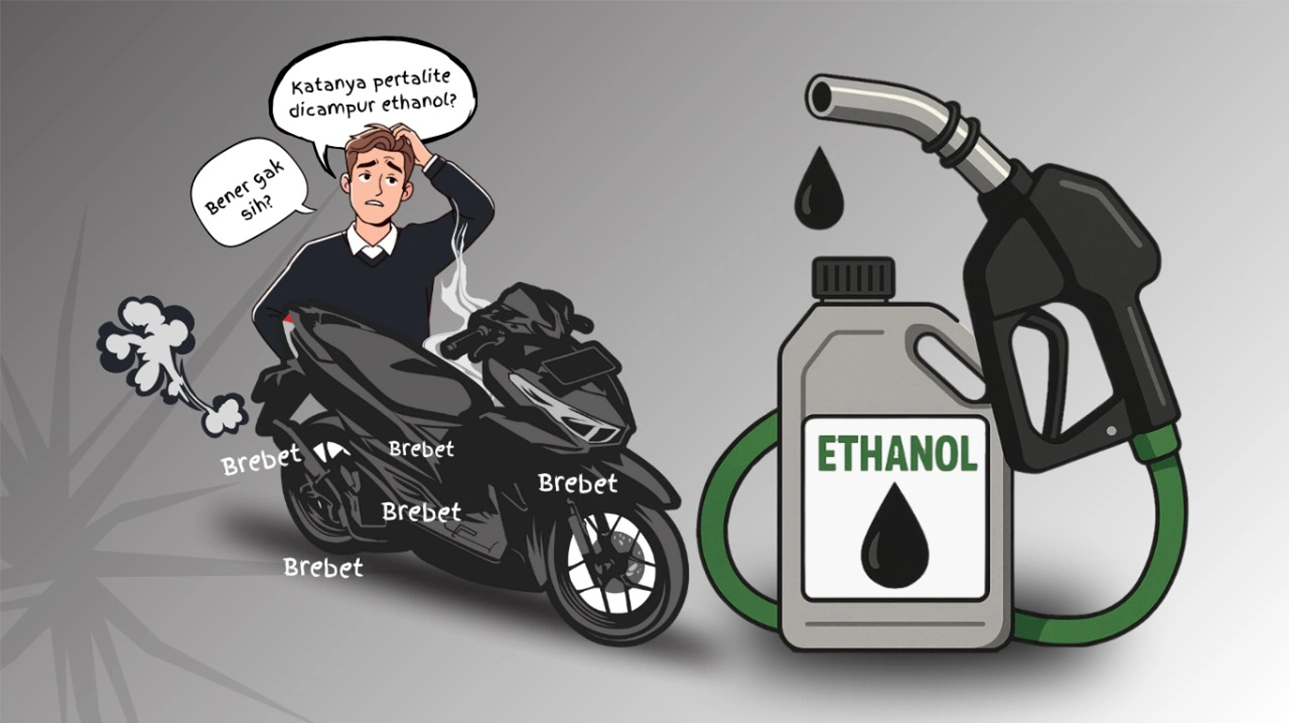Sepekan terakhir, warga di sejumlah wilayah di Jawa Timur—Tuban, Lamongan, Gresik, Sidoarjo, dan Surabaya—mengeluhkan motor mereka brebet, kehilangan tenaga atau sulitdigas setelah mengisi pertalite. Keluhan ini lalu memunculkan spekulasi bahwa ada sesuatuyang salah dengan kualitas pertalite. Bahkan sampai muncul dugaan pencampuran etanolyang tak resmi. Aroma bensin yang lebih alkohol-like adalah salah satu indikasinya.
Pertamina melalui Patra Niaga telah menyatakan bahwa uji laboratorium atas sampel pertalitedari terminal-terminal utama, khususnya di Tuban dan Surabaya, menunjukkan spesifikasiterpenuhi. Investigasi lanjutan kemudian diarahkan ke titik distribusi (SPBU) karena dugaanbahwa masalah bisa terjadi di tingkat akhir.
Keresahan masyarakat meluas hingga menarik perhatian pemerintah pusat. Menteri Energidan Sumber Daya Mineral (ESDM), Bahlil Lahadalia, turun langsung melakukan inspeksimendadak ke salah satu SPBU di Pakis, Malang, pada Rabu (29/10). Dalam pemeriksaanyang melibatkan Lembaga Minyak dan Gas Bumi (Lemigas), hasil uji laboratoriummenunjukkan bahwa kualitas pertalite di SPBU tersebut memenuhi semua standar yang berlaku dan layak digunakan.
Namun Bahlil menegaskan, pemerintah akan tetap mengusut secara transparan dan tidaksegan memberikan sanksi jika ditemukan pelanggaran di lapangan—baik oleh pihak SPBU maupun oleh Pertamina sendiri.
Menanggapi gelombang keluhan masyarakat, Ahad Rahedi, Area Manager Communication, Relations & CSR Pertamina Patra Niaga Regional Jatimbalinus, menyampaikan perusahaantelah membuka posko aduan resmi di SPBU Kebonsari, Surabaya. Posko ini menerimalaporan dari masyarakat yang mengalami gejala brebet, dengan total sekitar 20 laporan hanyadalam tiga hari pertama (28–30 Oktober 2025).
Pertamina pun mengambil langkah kompensasi langsung, yaitu mengganti bahan bakar di kendaraan pelanggan dengan pertamax sesuai volume pertalite yang sebelumnya dibeli, sertamemberikan biaya servis hingga Rp150 ribu per kendaraan. Langkah ini menjadi bentuktanggap cepat Pertamina dalam meredam keresahan publik, meskipun sumber masalah belumsepenuhnya teridentifikasi.
Keraguan Publik pada Pertamina
Fenomena brebet ini tidak bisa hanya dibaca sebagai persoalan teknis mesin atau kualitasbahan bakar semata. Ia membuka lapisan yang lebih dalam, yakni soal kepercayaan publikterhadap sistem distribusi energi nasional.
Pertalite sebagai bahan bakar bersubsidi, tidak bisa dilihat sebagai sekadar produk, melainkansimbol kehadiran negara dalam menjamin akses energi yang adil dan terjangkau. Ketika masyarakat mulai meragukan kualitasnya—apalagi setelah merasakan dampak langsungberupa kerusakan mesin—maka keraguan itu berpotensi berkembang menjadi krisiskepercayaan terhadap institusi penyedia dan regulator energi.
Pertamina telah menegaskan bahwa dari hasil pemeriksaan internal, spesifikasi pertalite di terminal distribusi utama masih sesuai standar. Namun, titik rawan justru berada di jalurdistribusi terakhir: dari terminal menuju SPBU, hingga ke tangki kendaraan konsumen. Di sinilah pengawasan dan sistem audit bahan bakar nasional diuji. Jika terdapat kelalaian, kontaminasi, atau pencampuran di luar standar, maka diperlukan mekanisme deteksi dan penegakan hukum yang lebih tegas serta transparan.
Kasus pertalite yang membuat brebet menjadi cermin penting tentang bagaimana sebuahproduk publik—yang diandalkan jutaan orang setiap hari—memerlukan sistem pengawasanyang bukan hanya teknis, tetapi juga sosial dan moral.
Ada tiga langkah yang perlu segera diprioritaskan, yaitu audit independen, transparansi, dan kebijakan kompensansi yang konsisten. Audit independen diperlukan agar hasil pemeriksaanbahan bakar bisa dipercaya oleh masyarakat. Setelahnya, transparansi dari terminal hinggaSPBU wajib dilakukan untuk menjaga agar tidak ada ruang manipulasi. Dan yang terakhir, kebijakan kompensansi konsisten harus diikuti dengan penyelidikan tuntas—audit independen dan transparansi—agar tidak berhenti sebagai solusi jangka pendek.
Brebet bukan sekadar brebet
Boleh jadi, fenomena brebet terlihat kecil bagi beberapa masyarakat. Namun fenomena inimemunculkan kekacauan kecil dalam sistem bahan bakar nasional. Ketika subsidi yang tidakhanya bicara tentang harga, tetapi soal kualitas, distribusi, dan kepercayaan.
Jika tidak segera dituntaskan dengan solusi yang konkret, maka kerugian teknis yang sudahmuncul sekarang bisa saja diikuti oleh terkikisnya kepercayaan publik yang lebih besar di masa mendatang. Jangan sampai subsidi yang harusnya membantu masyarakat dan menjadisalah satu hak, malah berakhir merugikan dan membuat masyarakat tak lagi percaya hak-haknya bisa dipenuhi oleh pemerintah.
Referensi
- https://kabartuban.com/pertalite-diduga-jadi-penyebab-motor-brebet-polisi-bakal-turun-tangan-lakukan-sidak-spbu/39270
- https://beritajatim.com/dosen-its-ungkap-penyebab-motor-brebet-setelah-isi-pertalite-bukan-sekadar-bbm-nya
- https://oto.detik.com/berita/d-8185103/banyak-motor-brebet-usai-isi-pertalite-ini-kata-pertamina
- https://www.thejakartapost.com/indonesia/2025/10/30/pertamina-to-probe-widespread-reports-of-vehicle-breakdowns-linked-to-pertalite.html
